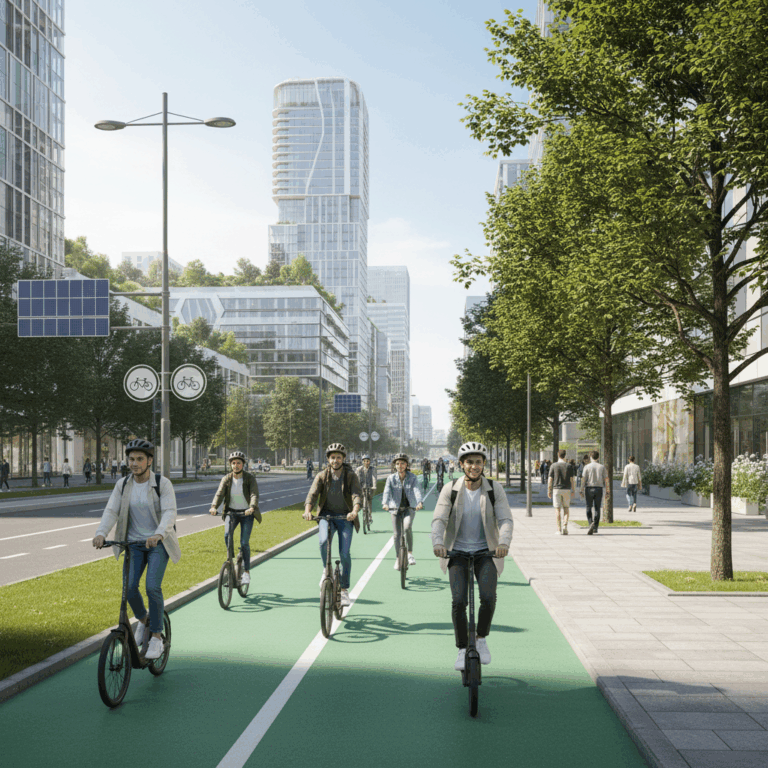Innovations in sustainable urban mobility
Urban mobility is constantly evolving, focused on sustainability and reducing emissions to improve the quality of life in cities. New technologies and ecological vehicles are protagonists in this change.
Among these innovations, smart scooters and electric bicycles stand out, offering efficient and environmentally friendly alternatives for daily urban trips.
These options not only reduce the environmental footprint, but also provide benefits in the management of space and the health of citizens.
Smart scooters and their environmental impact
Smart scooters are electric vehicles that operate without direct emissions, helping to reduce pollution in dense urban areas. Its use contributes to cleaner mobility.
Thanks to their compact size, they facilitate the reduction of parking space, allowing more areas to be used for green areas or recreational spaces for the community.
In addition, these scooters require fewer resources in their manufacturing and maintenance, which represents a significant improvement in the sustainable planning of cities.
The rise of electric bicycles in urban trips
Electric bicycles are gaining popularity as a sustainable means of transportation, especially among young people looking to combine health and efficiency in their travel.
This type of bicycle offers a practical and ecological option, which helps reduce pollution and optimizes energy consumption compared to traditional vehicles.
They also promote more active and healthy lifestyles, thus contributing to more sustainable and balanced urban mobility.
Advantages of scooters and e-bikes for the city
Scooters and electric bicycles provide multiple benefits in the urban context, promoting more sustainable and efficient mobility. These options reduce pollution and improve air quality.
In addition, they promote better organization of public space and encourage healthier lifestyles, key aspects for modern and liveable cities.
Its integration into urban mobility represents a positive change in the way people move, favoring cleaner and more comfortable urban environments.
Reduction of emissions and pollution
Scooters and e-bikes operate on electric power, which eliminates the direct emission of polluting gases in the city. This contributes to the improvement of air and public health.
Its use reduces dependence on traditional vehicles, significantly reducing the carbon footprint and combating climate change at the local level.
These alternatives also allow for quieter mobility, reducing noise pollution and improving the quality of life of urban inhabitants.
Optimization of urban space
Due to their compact size, scooters and electric bicycles require less space to circulate and park, favoring efficient urban organization.
This frees up areas that can be used for green areas, pedestrian areas or community infrastructure, improving the aesthetics and functionality of the city.
Reducing the size of vehicles contributes to decongesting streets, facilitating traffic and improving mobility during peak times.
Promotion of healthy habits
The regular use of electric bicycles and scooters promotes physical activity, benefiting the cardiovascular health and general well-being of users.
Furthermore, these options promote a more active and environmentally conscious lifestyle, encouraging sustainable and responsible travel.
Incorporating these means of transportation into the daily routine helps reduce sedentary lifestyle and improves the quality of life in urban communities.
Policies to promote sustainable transportation
Public policies are essential to promote more sustainable transportation systems and reduce the environmental impact in cities. Implementing appropriate regulatory frameworks favors the adoption of clean vehicles.
In different regions, plans are designed that encourage the use of electric scooters and electric bicycles, facilitating the transition towards more efficient and environmentally friendly urban mobility.
These initiatives favor the integration of new technologies in urban transport and promote cultural changes for more sustainable and conscious mobility.
Legislative initiatives in Spain
Spain advances with the Sustainable Mobility Law, which establishes goals to reduce emissions and improve air quality in cities through the electrification of transport.
The implementation of Low Emission Zones seeks to restrict access to polluting vehicles, promoting the use of clean alternatives such as scooters and electric bicycles.
In addition, economic and regulatory incentives facilitate the incorporation of electric vehicles and improve infrastructure for micro-mobility, transforming the transportation model in Spanish cities.
Sustainable mobility plans in Latin America
In Latin America, countries like Peru are developing plans to promote sustainable mobility, supporting electrification and the use of non-motorized transportation.
These plans include infrastructure improvements, regulation of the use of electric vehicles and campaigns to raise awareness about environmental and social benefits.
The authorities seek to integrate these models to reduce congestion, improve urban accessibility and promote healthier environments in the main Latin American cities.
Urban transformation and future of mobility
Urban transformation is linked to the integration of sustainable solutions that optimize the use of public space and promote greener development.
This process promotes mobility that combines technological innovation and environmental respect, essential for cleaner and more livable cities.
The future of urban mobility will depend on policies, infrastructure and habits that prioritize energy efficiency and quality of life.
Changes in the management of public space
Public space management is evolving to adapt cities to the demand for sustainable mobility, favoring bicycle lanes and pedestrian areas.
The redistribution of space is promoted, reducing areas for private vehicles and promoting accessible and safe environments for alternative means.
These changes contribute to a more organized city, with less congestion and more green spaces that improve citizen well-being.
Development of cleaner and more livable cities
Urban development seeks to reduce pollution through electric transportation and micro-mobility, creating environments with better air quality and lower noise.
The integration of scooters and electric bicycles encourages active, healthy and respectful mobility, which positively influences public health.
Clean and livable cities are the result of policies that encourage sustainability, green technology and community participation for a better future.







